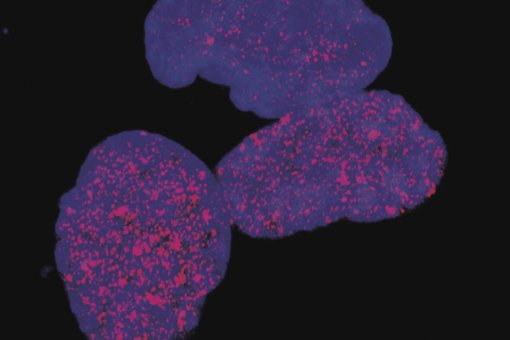Images
Participants


Contact

• The protein NSUN3 triggers a switch from glycolysis (carbohydrate metabolism), which is essential for primary tumour growth, to oxidative phosphorylation (fatty acid metabolism), which is necessary for metastasis.
• By inhibiting mitochondrial translation with commonly used antibiotics such as doxycycline or chloramphenicol, tumour cell invasion and spread are significantly reduced.
• Headed by the German Cancer Research Center and involving scientists at IRB Barcelona, the work is published today in the journal Nature.
Metastasis is the invasive spread of cancer from the primary tumour to other vital organs and it causes 90% of deaths related to this disease. For this expansion to take place, cancer cells have to survive unfavorable conditions, such as lack of oxygen and nutrient shortages, which they do by adapting their energy production.
IRB Barcelona scientists Dr. Salvador Aznar Benitah and Dr. Gloria Pascual have participated in a study led by Dr. Michaela Frye at the German Cancer Research Center (Deutsches Krebsforschungszentrum, DKFZ), which has revealed that the protein NSUN3 is key to the metabolic plasticity required by metastatic cells.
NSUN3 is a mitochondrial protein that regulates the production of new proteins, which are necessary to start the electron transport chain and ensure efficient energy use in the cell. Blocking the production of mitochondrial proteins by directly inhibiting NSUN3 or by using antibiotics such as doxycycline or chloramphenicol leads to a highly significant reduction of metastases.
"Metastasis is a highly energy-demanding process and, therefore, the cells that trigger it have to show very efficient fat metabolism," explains Dr. Aznar Benitah, ICREA researcher and head of the Stem Cells and Cancer laboratory at IRB Barcelona. "Although additional studies are necessary, this discovery is very encouraging because it opens a new avenue for the possible treatment of metastases," he adds.
“The importance of mitochondrial RNA modifications was previously studied in certain metabolic diseases. But we now show for the first time that there is a direct link between mitochondrial tRNA modifications and the invasive spread of cancer," says Dr. Frye, head of the Mechanisms Regulating Gene Expression lab at DKFZ.
Mitochondria—the key element in metabolism and metastasis
Mitochondria are tiny, membrane-enveloped structures known as the powerhouse of every cell in our body. For energy production, they use the so-called respiratory chain present in the mitochondrial membrane. Because mitochondria have their own genetic material, they can produce key components of the respiratory chain.
The production of components of the respiratory chain is tightly regulated by specific machinery in the mitochondria, and NSUN3 is pivotal in this process. This study reveals the key role of mitochondrial protein synthesis in metastasis.
Given the similarity between bacterial and mitochondrial membranes, certain antibiotics curb mitochondrial protein synthesis without affecting "general" protein synthesis in the cell. Therefore, the researchers assumed that these agents would affect cancer cells in a similar way as the loss of NSUN3 expression.
Indeed, treatment with antibiotics such as chloramphenicol and doxycycline reduced the invasive spread of cancer cells. Antibiotic administration also reduced the number of lymph node metastases in a mouse model.
RNA modifications regulate mitochondrial function and drive metastasis
The team led by Dr. Frye discovered that a specific chemical modification found in mitochondrial tRNA, known as "m5C" (5-methylcytosine), is necessary for the development of metastasis. The m5C modification increases mitochondrial protein synthesis, which in turn boosts the production of respiratory chain components. Consequently, the cell increases its energy reserve to fuel demanding cellular processes, such as the spread of cancer cells from the tumour.
In contrast, cancer cells lacking m5C obtain their energy through a comparatively less efficient mechanism called glycolysis and have limited ability to spread metastatically. The researchers demonstrated this using human tumours grown in mice. However, cell viability or growth in the primary tumour was not affected by the loss of m5C.
RNA-modifying enzyme as a biomarker for metastatic tumours
A specific enzyme, the methyltransferase NSUN3, is responsible for the m5C RNA modification. When the scientists switched NSUN3 off, mitochondrial tRNA was less modified and the invasive spread of the cancer cells decreased.
Could NSUN3 function as a biomarker for metastatic cancer? Gene expression signatures indicating high cellular NSUN3 levels and elevated m5C levels were indeed predictive for lymph node metastases and more severe disease progression in patients with head and neck cancer.
The inhibition of the enzyme NSUN3 emerges as a promising way to slow down metastasis because it is solely responsible for the metastasis-promoting m5C RNA label. However, the potential long-term side effects of blocking mitochondrial protein synthesis must first be further explored.
Related article:
Mitochondrial RNA modifications shape metabolic plasticity in metastasis
Sylvain Delaunay, Gloria Pascual, Bohai Feng, Kevin Klann, Mikaela Behm, Agnes Hotz-Wagenblatt, Karsten Richter, Karim Zaoui, Esther Herpel, Christian Münch, Sabine Dietmann, Jochen Hess, Salvador Aznar Benitah & Michaela Frye
Nature 2022 DOI: 10.1038/s41586-022-04898-5
About IRB Barcelona
The Institute for Research in Biomedicine (IRB Barcelona) pursues a society free of disease. To this end, it conducts multidisciplinary research of excellence to cure cancer and other diseases linked to ageing. It establishes technology transfer agreements with the pharmaceutical industry and major hospitals to bring research results closer to society, and organises a range of science outreach activities to engage the public in an open dialogue. IRB Barcelona is an international centre that hosts 400 researchers and more than 30 nationalities. Recognised as a Severo Ochoa Centre of Excellence since 2011, IRB Barcelona is a CERCA centre and member of the Barcelona Institute of Science and Technology (BIST).




